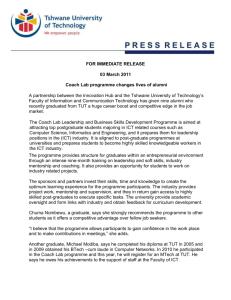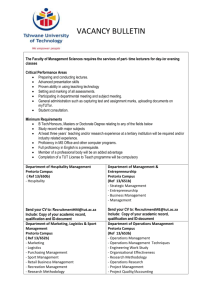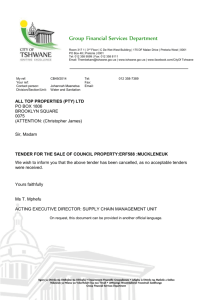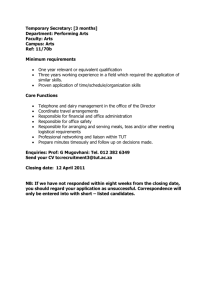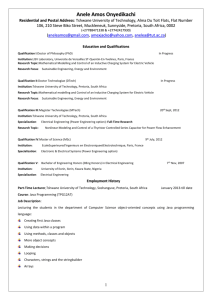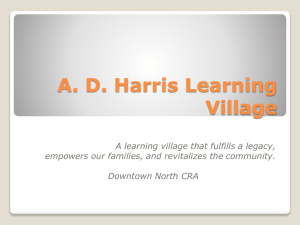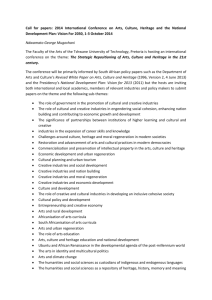CRA SLP Advert (2008) - Tshwane University of Technology
advertisement
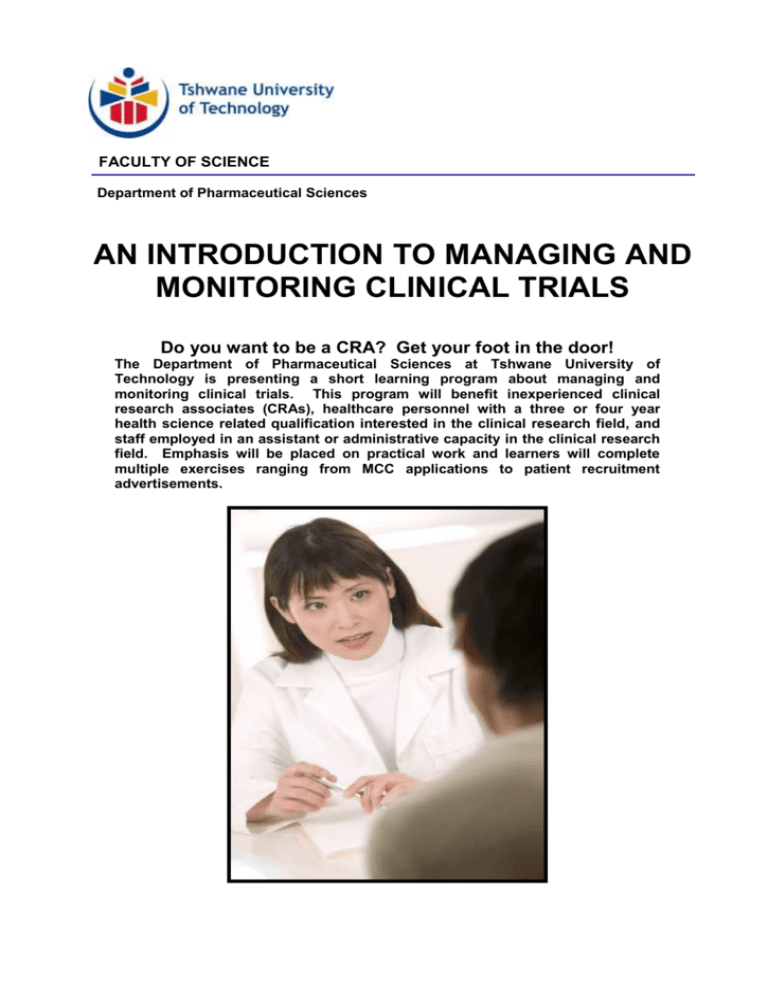
FACULTY OF SCIENCE Department of Pharmaceutical Sciences AN INTRODUCTION TO MANAGING AND MONITORING CLINICAL TRIALS Do you want to be a CRA? Get your foot in the door! The Department of Pharmaceutical Sciences at Tshwane University of Technology is presenting a short learning program about managing and monitoring clinical trials. This program will benefit inexperienced clinical research associates (CRAs), healthcare personnel with a three or four year health science related qualification interested in the clinical research field, and staff employed in an assistant or administrative capacity in the clinical research field. Emphasis will be placed on practical work and learners will complete multiple exercises ranging from MCC applications to patient recruitment advertisements. The role of the clinical research associate (CRA) within the pharmaceutical industry has evolved extensively in the past 30 years, paralleling the growing complexity of drug development over this period. Over the past decade, the amount of clinical research being conducted in South Africa has increased dramatically. Ames Dhai, the director of the Steve Biko Centre for Bioethics and a member of the National Health Research Ethics Council, commented that between 1996 and 1997 the clinical trial industry increased by 40 percent in South Africa, while internationally there was a 16-fold increase. There are currently 397 trials registered with the South African National Clinical Trial Registry. The need exists for increasing numbers of suitably qualified personnel to conduct and monitor these trials. The industry is currently experiencing a shortage of trained, experienced personnel, according to a needs analysis conducted by the Department of Pharmaceutical Sciences at Tshwane University of Technology in February 2007. Failure to meet the need for experienced and qualified personnel in clinical research organisations will result in a loss of job creation and also negatively impact the number and quality of trials conducted in South Africa. In response to this need, a short learning program (SLP) has been developed to provide training to staff that are currently employed or interested in the clinical research industry. Short Learning Program Title: An introduction to managing and monitoring clinical trials Who will benefit from this short learning program (SLP): Inexperienced clinical research associates (CRAs); Healthcare personnel with a three year health science related qualification, interested in the clinical research field; The short learning program will also be of benefit to staff employed in an assistant or administrative capacity in the clinical research field; This SLP has the potential to uplift staff currently working in assistant capacity, but this is dependent on the internal policy of each pharmaceutical company or contract research organization. Each independent clinical research organisation has its own in-house policy on qualifications required for the various levels of staff occupied with clinical trial monitoring, as there are currently no national statutory qualification requirements for staff involved in monitoring clinical trials. Access to the Qualification: Applicant must comply with one of the following 2 criterion: Criterion 1 Criterion 2 Learners who have a National Senior A minimum three year diploma or degree Certificate as certified by the Council for qualification in the field of health sciences General and Further Education and Training (UMALUSI) (from 2009) OR the Senior Certificate (before 2009) AND A minimum of three years of experience in the workplace as a clinical trial assistant, a clinical trial administrator or a clinical trial secretary or any other field equivalent to the above We empower people Tel. (012) 382 6306, Fax (012) 382 6243, www.tut.ac.za 2 Arcadia Campus, Private Bag X680, PRETORIA, 0001 Purpose of the Qualification: The recipient of the SLP certificate will have received a basic introduction to managing and monitoring a clinical trial to contribute to ensuring the safety of patients, protecting of patient rights and ensuring integrity and quality of the scientific data collected. This includes: Selecting appropriate investigators; Preparing regulatory and ethical submissions; Ensuring that the proper process for informed consent is followed; Initiating of trial centres; Conducting monitoring visits; Overseeing the closing of trial centres; Identifying adverse events and serious adverse events; Following ICH GCP and other relevant guidelines, regulations and legislation; Adhering to currently accepted ethical standards of practice for clinical trials. This SLP will be in accordance with the International Conference of Harmonisation (ICH) on Good Clinical Practice (GCP). Learning Assumed to be in Place: Computer literate (MS Office – Word, Excel, Power Point competence is a strong recommendation); Oral and written communication skills; Three years working experience and a superficial knowledge of the clinical trial process OR a three year qualification in health sciences. Integrated Assessment: Continuous assessment will be performed using the following methods: Role play; Verbal presentations; Case studies; Problem solving assignments; Written assignments; Projects; Practical exercises; Portfolio of learning material. Learners will be expected to complete assignments, exercises, presentations and write tests. The final integrated assessment will be a formal written test to measure applied competence. It will assess whether learners are able to plan, manage and monitor clinical trials, understand the theoretical basis behind these actions and reflect and make changes to their practices. A short learning program certificate will be awarded to all successful learners. We empower people Tel. (012) 382 6306, Fax (012) 382 6243, www.tut.ac.za 3 Arcadia Campus, Private Bag X680, PRETORIA, 0001 Dates: Day Day 1 Day 2 Day 3 Day 4 Day 5 Day 6 Day 7 Date 20-Oct-08 21-Oct-08 22-Oct-08 23-Oct-08 24-Oct-08 22-Nov-08 06-Dec-08 Time Topic 8:00 - 9:00 Registration 9:00 - 9:30 Introduction and SLP discussion 9:30 - 10:00 Module 1: Pre-Clinical Research and Development 10:00 - 10:30 Quiz 10:30 - 11:00 Tea break 11:00 - 13:00 Module 2: Clinical Research 13:00 - 14:00 Lunch 14:00 - 15:30 Module 3: ICH GCP and SA GCP 15:30 - 17:00 Module 4: Informed Consent Homework Short Assignment to complete 8:30 - 11:00 Module 5: Introductory Biopharmaceutics 11:00 - 11:30 Tea break 11:30 - 13:00 Drug Interactions (Exercise) 13:00 - 14:00 Lunch 14:00 - 17:00 Ethics discussion Home work Short Assignment to complete 8:30 - 10:30 Module 6: Clinical Trial Design 10:30 - 11:00 Tea break 11:00 - 12:00 Protocol Discussion 12:00 - 13:00 Module 7: Course of a clinical trial (Exercise) 13:00 - 14:00 Lunch 14:00 - 17:00 Module 7: Site Selection Visit (Role Play) 8:30 - 9:00 MCC & SAMA applications 9:00 - 10:00 Module 7: Site Initiation Visit & Oral Presentations 10:00 - 11:00 Module 7: Monitoring Visit 11:00 - 11:30 Tea break 11:30 - 12:30 Module 7: Site Closure Visit 12:30 - 13:00 Investigator Payment 13:00 - 14:00 Lunch 14:00 - 15:00 Module 8: Source Data Verification (Exercise) 15:00 - 17:00 SDV Exercise 8:00 - 9:00 Module 9: Drug Accountability 9:00 - 10:00 Drug Accountability Exercise 10:00 - 11:00 Module 10: Adverse Events & Exercise 11:00 - 11:30 Tea break 11:30 - 12:30 Module 11: Essential Documents 12:30 - 13:00 Module 12: Subject Recruitment 13:00 - 14:00 Lunch 14:00 - 15:00 Advertisement Exercise 15:00 - 15:30 Module 13: Audits 15:30 - 17:00 Module 14: Communication and Negotiation Skills 8:00 - 11:00 Site Initiation Visit Presentations 11:00 - 12:00 Industry Talk 12:00 - 13:00 Feedback on Portfolio Assessments 9:00 - 12:00 Final Written Examination We empower people Tel. (012) 382 6306, Fax (012) 382 6243, www.tut.ac.za 4 Arcadia Campus, Private Bag X680, PRETORIA, 0001 Presenters: The course will be presented by four different experts in the field of clinical research. Cecilia van Niekerk is a registered pharmacist and worked as a CRA for three years at a clinical research organisation as well as a multinational pharmaceutical company. She is currently employed as a lecturer at Tshwane University of Technology and completing a PhD in natural product development. She developed the course and will present the majority of the classes. Dr Gill Enslin is the Head of the Department of Pharmaceutical Sciences at Tshwane University of Technology, she is an expert in the field of biopharmaceutics and will present the classes related to this topic. Dr Dewald Snyman is also a registered pharmacist, but is currently employed as the clinical research manager at a contract research organisation and he will present some clinical research topics. Dr Braam Hoffman is the deputy chairperson of the ethics committee of Tshwane University of Technology and an expertise in clinical research ethics. Testimonial: Hi Cecilia, I must say I am so grateful to you and I can’t tell you how much that course has assisted. It made all the difference right from getting the job down to the actual handling of the day to day tasks on the job. Initially the company employed me with the intention of training me for 6 months, where I was not supposed to work on any trials by myself. I was put under someone's supervision. However, I can quite frankly and proudly say that only after two months of doing that, I have been given three sites in Africa (Uganda and Tanzania) to handle on my own. I have also been handed over an NIH (National Institute of Health, Department of Health, USA) study going on at Baragwaneth hospital in Soweto to monitor just on my own, and more are still coming according to my line manager. And this, according to my line manager, is because of the speed at which I have been able to mature into monitoring so quickly. But I must say, deep down, I know it is the short course that prepared me for the challenges and how to navigate through them. The course was very practical, especially since it was managed by someone with Monitoring experience assisted by very experience CRA's (Dewald Snyman from PPD). A lot of practical examples were given, a lot of real life scenarios were presented in the exercises and the TRUTH about the job was not hidden. The course manager was quite frank about the "downside" of the job as she was about the upside and it was always the course taker's choice to make on whether to pursue that line of work or not. I chose to follow it, I am three months into the job, and I am doing quite fine so far. I don’t feel like am in strange territory. During the course, one of the most daunting exercises was preparing an MCC application, I am proud to say that I have been assisting someone prepare an MCC application, in which I did about 60% of the work for March and April and she was quite pleased with my performance. Again, this I cannot entirely credit on anything innate in me, a lot of credit goes to what I learnt from the course. I would encourage anyone that is interested in joining the Clinical research Industry as a CRA or CTA to take the course, it is quite grueling honestly, but when you are on the job, you will realise how fast things happen well for you. Clinical research is a very interesting field; it is for me so far. And it is a multi-million dollar industry worldwide. CRO's bill quite heavily on their clients and it is the CRA's that do the work. In other words, CRA make money for the CROs. So CROs find it their responsibility to treat CRA's extremely well, after all they earn the money for the company. So one is always well facilitated. Companies pay your phone bills, air travel, hotel accommodation, airport parking, transfers, meals, fuel expenses, internet charges and retreats involving family. Which is quite good for anyone’s motivation since CRAs work really long hours involving travelling to strange places? In my three months as a CRA, I have been to places in Uganda (my own country) that I had never thought of going to. I have been to Ghana, Congo, Nigeria and Gabon, amazing......simply amazing! Nothing can describe my feeling. But I must also say, there is plenty of work to do, very strict timelines for projects, people's health at stake so attention to detail is key, and plenty of paperwork, reading, filing and refilling. A lot of working at home, on the plane, in the hotel, in the restaurant, you are a CRA almost 15 hrs of your day. We empower people Tel. (012) 382 6306, Fax (012) 382 6243, www.tut.ac.za 5 Arcadia Campus, Private Bag X680, PRETORIA, 0001 If you are not writing a report, you are reading a protocol. All this was explain and covered in the course, so when I took my career plunge, I knew what to expect; the up and downsides. Edward Mukwaya (Completed course in 2007) Clinical Research Associate OnQ Lecture Material: All necessary material will be supplied by the Tshwane University of Technology Cost: R 5 500-00 (VAT N/A) To be paid before 30 September 2008 (Invoices will be supplied) Venue: Tshwane University of Technology Arcadia Campus Room 3-314 175 Nelson Mandela Drive Arcadia Pretoria Level: This qualification will be set at level 5 of the Higher Education Qualifications Framework. 200 hours will be spent in total on this program by the learner over a period of 7 weeks. Field and Sub-Field of the Qualification: Health Sciences and Social Services, NSB 9 Application forms to be submitted: Application for admission to a short learning programme (attached) Short CV Certified copies of all qualifications Certified copy of ID document Signed Study Conditions (attached) Signed letter from your manager as proof that you have been employed for a minimum of three years as a clinical trial assistant, a clinical trial administrator or a clinical trial secretary or any other field equivalent to the above (Only necessary for applicants not fulfilling criterion 2) Incomplete submission will not be considered for approval. As soon as we have received your full application, we will send you an invoice for payment. Please e-mail the completed application forms to vanniekerkhc@tut.ac.za before 29 Aug 2008. We empower people Tel. (012) 382 6306, Fax (012) 382 6243, www.tut.ac.za 6 Arcadia Campus, Private Bag X680, PRETORIA, 0001 You can also deliver the documents to the address below or bring the original documents to the first class on 20 Oct 2008: Att: Cecilia van Niekerk Tshwane University of Technology Arcadia Campus 175 Nelson Mandela Drive Building 3, Level 3 Department of Pharmaceutical Sciences (School of Pharmacy) Arcadia Pretoria 0083 Deadline for applications: 29 August 2008 Deadline for payments: 30 September 2008 For more information on this short learning program, please contact Cecilia van Niekerk at 079 492 3097 or vanniekerkhc@tut.ac.za We empower people Tel. (012) 382 6306, Fax (012) 382 6243, www.tut.ac.za 7 Arcadia Campus, Private Bag X680, PRETORIA, 0001
